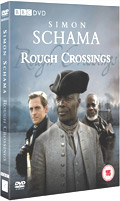You are here: Reports » Phase 1: media » Reviews » Rough Crossings
Rough Crossings
Presenter: Simon Schama
Producer: Steve Condie
Date: Friday 23 March 2007
Time: 9.00pm

Rough Crossings is a drama-documentary focusing on the story of those involved in the relocation of former enslaved peoples, who escaped bondage to fight for the British during the American Revolutionary War. These 'black loyalists' would eventually be relocated from Nova Scotia, Canada, to Freetown, Sierra Leone, an occurrence brought about through a dialogue of politics and morality. The programme fuses Schama's discussions to the camera with reconstructions of events using letters and journals from the period.
The programme places itself in a position of revealing a history which has hitherto been forgotten, that enslaved peoples fled the plantations of America to join the British during the War of Independence, in exchange for the promise of freedom. Schama assures the viewer that, 'I had no idea about this story myself.' On the basis of this apparent absence in the 'collective memory' of a number of countries, the programme sets out to answer both the history of the settlement of Freetown and the effects of this history on contemporary notions of American, British and African identity. The success of this endeavour is unfortunately limited as the programme fails to inform its audience which this history should be remembered apart from its perceived strangeness and neglect. Schama states how this story of, 'free will against the odds' is inspiring, but doesn't engage in why this story should be important to its viewers at this particular moment in time. The programme also makes the decision to represent 'Africa' as a country on a number of occasions, rather than being a collection of different cultures. The programme's weakness in delivering an effective message is also let down in its use of Schama's pieces to camera and the dramatic reconstructions of the story. Schama is filmed repeatedly with a shaky camera style in the first half of the programme, wandering the streets of London and New York, with people passing in front of him in the foreground. This difficult mode of filming then gives way suddenly, in the second half of the programme, to the sole use of dramatised versions of historical sources. The two do not sit well together as the different styles require different responses by their audience.
The decision to focus on the use of this history for reassessing identities also becomes problematic as the dramatic reconstructions tend to focus on the experiences and perceptions of John Clarkson, former Royal Navy Captain, brother of the abolitionist Thomas Clarkson and the first Governor of Freetown. It is this man, rather than the 'black loyalist' Thomas Peters, or the Baptist Minster David George, who is cast as the main character in the story. Peters, a fierce, determined man who escaped a life of slavery to fight for the British, is portrayed as seditious. The opportunity of engaging with a historical character who does demonstrate, 'free will against the odds', is thereby lost. There are a host of inspirations regarding identity to be taken from this history; the one offered by the programme is vague and meek in comparison to the strength which is often evidenced in this story. The programme also neglects the stories of the substantial number of women who also made the crossing to Sierra Leone and assisted in the survival of the early colony. One of the strengths however of Rough Crossings is its use of historical materials in the dramatic reconstructions; letters and journal entries are acted out rather than merely read creating a more accessible account. In setting up the documentary as a means by which the audience can reconsider 'our ancestors', a limited perspective of those ancestors are offered.
